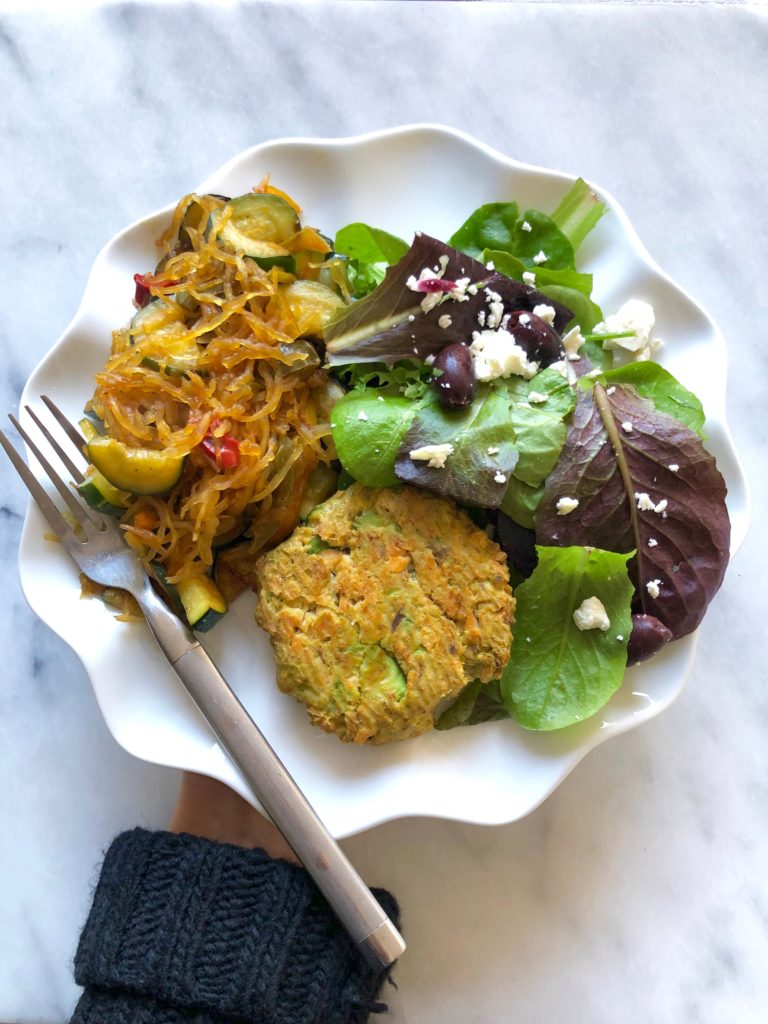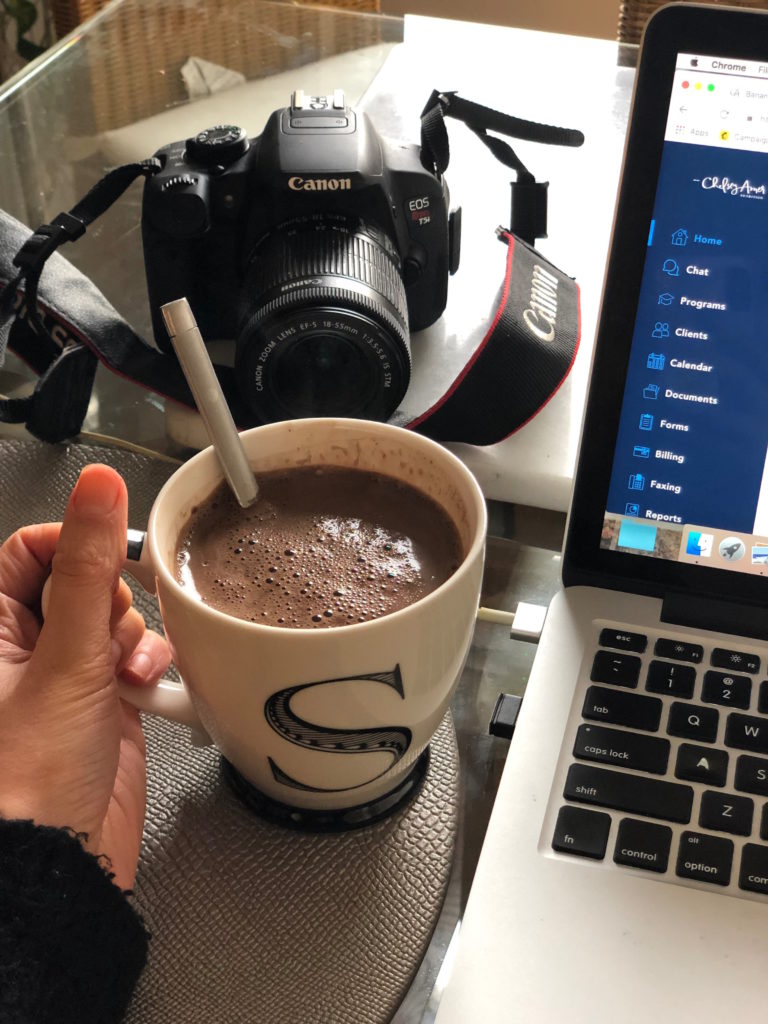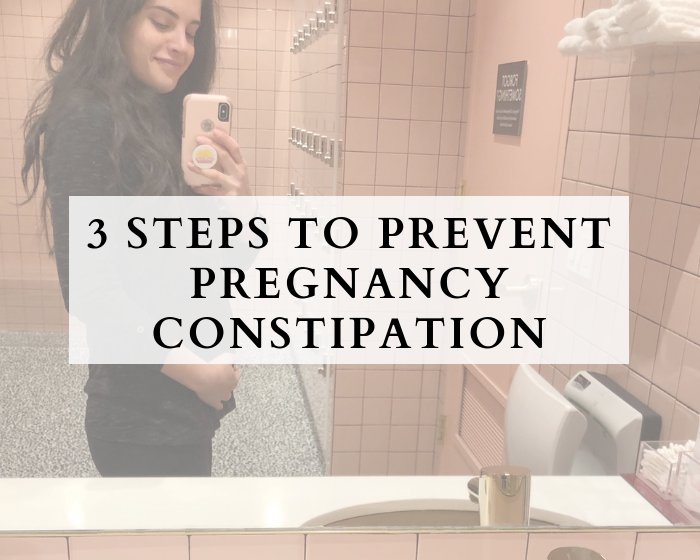3 Steps to Prevent Pregnancy Constipation
Throughout my pregnancy I’m covering a variety of topics from personal updates to more nutrition-related topics, like how to prevent pregnancy constipation. If there’s a topic you’d like covered, let me know!
Take a guess… bloat or baby…?!?

(P.S. – It was definitely a bit of each…)
Pregnancy is such a miracle and I feel so lucky to actually be growing a life!
But with every beautiful event in life, there are some downsides. And one major pitfall of pregnancy that I don’t think we talk about enough is PREGNANCY CONSTIPATION!
As a dietitian, I talk about poop all the time. So for me, it doesn’t seem like a taboo topic to discuss pregnancy bowel habits, but I understand it can be, errr, uncomfortable. No one else really needs to know what’s going on in the bathroom, but for pregnant woman there can be a whole lotta NOTHING.
If you’ve ever been constipated, you know how uncomfortable being stuffed up can feel. You feel extra heavy, extra sluggish, and extra large (and a pregnant woman, especially, doesn’t need to feel ANY of those things!).
Not to mention, being constipated for a prolonged period of time isn’t safe. It can lead to more serious complications like hemorrhoids, impacted stool, reduced appetite, and more.
But let’s take a step back…
Why Does Pregnancy Constipation Occur?
Like most other side effects of pregnancy, you can start with thanking your HORMONES! Increased progesterone levels allow your smooth muscles to relax. Your intestines are made from smooth muscle, and relaxed intestines equal a sluggish passage of food.
Plus, as your uterus grows with the size of your baby, all your parts get a tad bit cramped in there. This makes it even more difficult to stay regular.
And don’t forget those prenatal vitamins that are so important for you to take! Their increased iron content can lead to constipation as well.
Even more, 3 common side effects of pregnancy can increase the likelihood of pregnancy constipation:
- Stress (Yes, being pregnant can be stressful… “Wait, can I eat this?” “Is this safe for the baby?” I could go on and on!)
- Eating a low fiber diet (You can thank nausea, exhaustion, and wanting comfort foods for this! Plus, most Americans don’t eat enough fiber to begin with. Sneak peek – I’ll show you how to up your fiber below!)
- Not exercising (Exhaustion that accompanies growing a human – or maybe more than 1 – can make it even easier to skip the gym.)
But there is an upside! The slower passage of food means there’s more times for nutrients to be absorbed (and then delivered to your babe on the way).
Side Effects of Pregnancy Constipation
Although unlikely to harm your baby (according to my OB and research), constipation can cause many uncomfortable side effects.
- Hemorrhoids can form from straining too hard. In case you didn’t know, hemorrhoids are swollen veins in the end of your intestinal tract. They can get inflamed, irritated, and even get infected, so it’s important to avoid at all costs.
- Rectal bleeding
- Bloating
- Gassiness
- A general stuffed up feeling
How to Prevent Pregnancy Constipation
As a dietitian, I’m well-trained to prevent and alleviate constipation, BUT pregnancy constipation is a whole other beast (after all, you’re working against hormones and prenatal vitamins – 2 things that cannot be changed!).
When you Google “pregnancy constipation,” most of the common advice suggests 3 common remedies: eat more fiber, drink more fluids, and exercise. While I 100% agree with these 3 components to alleviate constipation, it’s not always as simple as described.
Here are my dietitian-approved tips to prevent pregnancy constipation:
1. Fill Up On Fiber
Eating enough fiber is essential for good health whether you’re constipated or not (or pregnant or not). Current recommendations suggest consuming 25-30 grams of fiber daily. To truly prevent constipation, it’s important to boost your fiber intake to a minimum of 30 grams daily and be consistent about your fiber intake.
What foods have fiber? Focus on:
- Vegetables
- Fruit
- Whole grains
- Beans and legumes

If you currently follow a low fiber diet (less than the recommended 25-30 grams per day), slowly increase your fiber intake (along with water). If you suddenly start eating bran flakes for breakfast and a huge salad with beans at lunch, and whole grains at dinner (when you didn’t eat any of those foods before), you can actually worsen constipation. Even more, if you don’t increase your fluid intake while you increase your fiber intake, you can slow down transit time even more.
Here’s a sample meal plan that has 30 grams of fiber:
- Breakfast: Greek yogurt parfait with 1 cup bran flakes and 1 cup berries
- Lunch: Roasted salmon and white bean salad
- Snack: Chocolate chia pudding
- Dinner: Chicken and mixed veggie stir fry over 1/2 cup quinoa
When you’re nauseous during your first trimester, it can be especially hard to meet your daily fiber needs. Give yourself some grace! Most nausea passes by the end of your first trimester, so do what you can, where you can!
Personally, I barely ate vegetables throughout my entire first trimester. I had a lot of toast (opted for whole grain where I could and loved the high fiber Thomas’s English muffins) and sprinkled chia seeds on everything (they have about 5 grams of fiber per tablespoon).
I was also a big fan of lentil-based pastas. They calmed my stomach like regular pasta, but had a lot more fiber. See what works for you – every pregnancy is different!
What about fiber supplements? If your doctor gives it the OK, fiber supplements, like acacia fiber or Psyllium Husk Powder can be great to help move things along. The same guidelines as mentioned above still apply – use smaller doses to begin and definitely boost your water intake!
Personally, I’ve been relying on high fiber crackers to boost my fiber intake while pregnant. GG crackers and Flackers are 2 of my staples. (I stock up on Flackers from Thrive Market!) They’re not the most delicious crackers (the GG crackers can be a bit dry), but they definitely help as far as constipation is concerned!
I also snack on a few prunes everyday. First, I think they’re delicious! Second, they’re sweet so they satisfy my after-lunch sweet tooth (without chocolate!). For more fiber-filled foods, check out my Pantry Staples Shopping List. It’s important to eat enough fiber, pregnant or not!
2. Drink Enough Water
Whenever you increase your fiber intake, you should also drink more fluids. Specifically, water.
We usually don’t drink enough water (especially with increased urine frequency while pregnant), and it’s even more important while pregnant.
If you’ve taken my Hydration Challenge, then you know I typically suggest monitoring your hydration level by the color of your urine. Yes, I understand that it’s gross to look in the toilet bowl, but when pregnant, it’s even more important to be sure your urine is pale yellow for adequate hydration.
Even when I’m not pregnant, I always carry around my huge reusable water bottle that I can fill up anywhere. This one is my favorite (and I love the bright orange color I have – it’s easy to spot!). Yes, it’s heavy when it’s full, but that’s just even more incentive to stay hydrated.
Warm fluids may also help stimulate contractions in your intestines. Personally, I love hot chocolate during the winter, but decaffeinated tea or warm water with lemon and/or ginger can also be really soothing.
I suggest avoiding most juices due to their high sugar content, however, prune juice does have a slight laxative effect. If you’re truly backed up, this is one you may want to try.

3. Get Moving
Don’t underestimate what a little movement can do for you! Even walking for 10-15 minutes can help stimulate your GI tract to get things moving!
I’ll do another post dedicated to my pregnancy workout regimen, but I have to say that even on the days when I feel most bloated and blah (which is guaranteed to happen at SOME point over the course of 9 months), working out makes me feel better… and stimulates my GI tract! 😉
Think about it… have you ever been sitting at your desk ALL day and have noticed you feel a little sluggish? (Or at least your GI tract does?) When you get moving throughout the day, you may find it helps. I suggest starting with some morning movement or even light stretching (there are so many prenatal yoga videos on YouTube!), then going for a stroll around lunchtime (even if you don’t feel like it!), and then again in the evening.
Living in New York City, we’re spoiled that we get to walk most places – even in 30 degree winter weather – so if you’re in the suburbs or a rural area, try parking your car further away, or even just walking around your house!

So there you have it… the 3 tips that have been working for me to prevent pregnancy constipation over the past 20+ weeks! No, it’s not perfect and there are definitely times I need some extra (pharmaceutical) help, but by working on these 3 things, you’ll be better off than where you started!
Questions? Comments? Over the poop talk?
Let me know…
XO




 Hi there!
Thanks for stopping by! I'm Chelsey, an online Registered Dietitian, recipe developer, budding photographer, and coffee addict! My mission is to help you feel good through food by answering the question "What should I eat?" Let's make nutrition approachable!
I hope you enjoy my personal collection of simple, healthy, food allergy friendly and nutritiously delicious recipes, plus tips and tons of tricks that will help YOU live a nutritionally-balanced life! I look forward to getting to know you better...
Hi there!
Thanks for stopping by! I'm Chelsey, an online Registered Dietitian, recipe developer, budding photographer, and coffee addict! My mission is to help you feel good through food by answering the question "What should I eat?" Let's make nutrition approachable!
I hope you enjoy my personal collection of simple, healthy, food allergy friendly and nutritiously delicious recipes, plus tips and tons of tricks that will help YOU live a nutritionally-balanced life! I look forward to getting to know you better...







